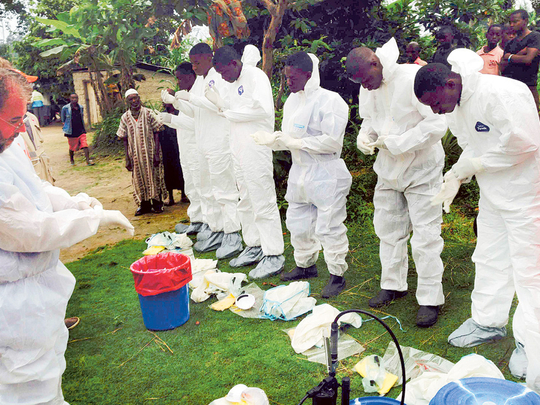
Ebola Virus Disease (EVD) or Ebola Haemorrhagic fever is a severe, and often fatal virus that occurs in humans as well as primates.
The culprit, Ebola, threatens the life of its human host by causing him/her to have lethal generalised haemorrhagic bleeding. The current Ebola outbreak has spread across three countries in West Africa: Liberia, Guinea and Sierra Leone. However, there is potential for further spread in other parts of Africa, as well as other continents, due to the growth of the aviation industry and air travel. Local reports have confirmed a single lethal case in Saudi Arabia.
There are several challenges the healthcare system faces when dealing with this virus.
For starters, when a person is infected with this virus, the initial symptoms are very non-specific and often mimic symptoms of a viral flu. It is only after this phase that the more threatening symptoms appear, such as severe bleeding and dehydration. To the unexperienced individual, he or she may refrain from calling for medical assistance until it is too late. Fatality rates are 50 to 90 per cent and increases in the later stages.
An initiative to battle this issue would involve educating the general public of the symptoms and basic virus physiology that Ebola may present.
Encouraging individuals not to travel to West Africa at this stage is also another plausible suggestion. Screening individuals at risk, by assessing the presence of the virus in the blood through viral-immune/genetic tests(depending on geographical location) is another step. However research has to be done to establish whether this is a measure that is actually effective, and we all know that time is against us during an outbreak.
From a treatment point of view, it is purely a supportive process, and we have yet to discover an anti-viral agent to destroy this virus, or a vaccine to make us immune to it.
Despite an increase in medical research aimed at understanding the virology of Ebola, manufacturing an anti-viral and a vaccine is still far away. This could be due to a) difficulty in understanding the virus and its defence versus its resistance mechanisms, b) and lack of interest by pharmaceutical companies.
As Ebola is currently a major outbreak in Africa, it includes areas where there is little chance that phramaceutical manufacturers will recoup their investment. Perhaps the surge of fatalities will direct further investments from various countries around the world to help us identify a magic bullet for this illness. Therefore, an international collaboration is a good first step towards curbing the disease until a cure can be found.








